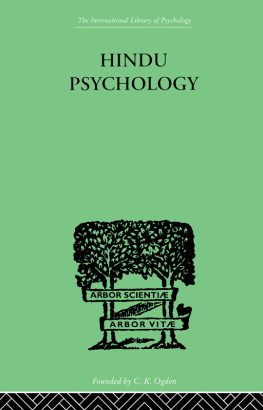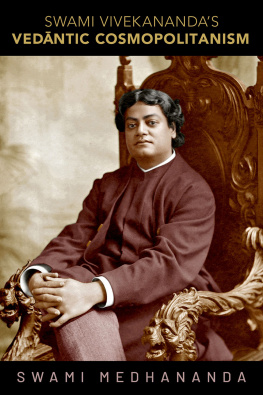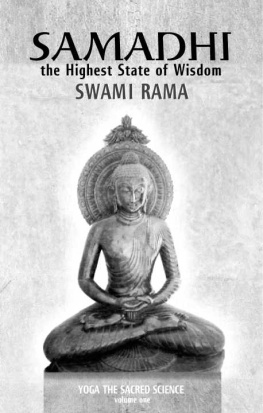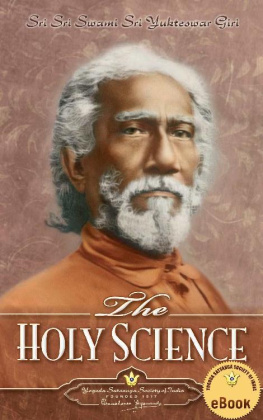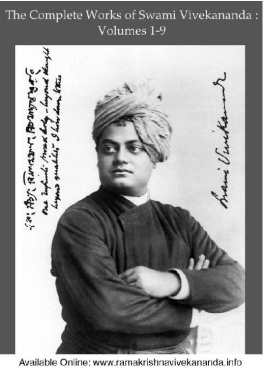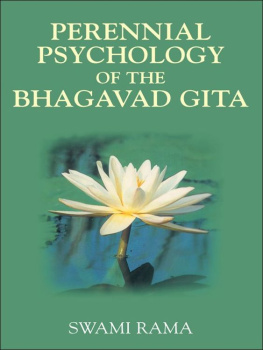Swami Akhilananda - Hindu Psychology: Its Meaning for the West
Here you can read online Swami Akhilananda - Hindu Psychology: Its Meaning for the West full text of the book (entire story) in english for free. Download pdf and epub, get meaning, cover and reviews about this ebook. year: 2012, publisher: Taylor & Francis Ltd;Routledge, genre: Religion. Description of the work, (preface) as well as reviews are available. Best literature library LitArk.com created for fans of good reading and offers a wide selection of genres:
Romance novel
Science fiction
Adventure
Detective
Science
History
Home and family
Prose
Art
Politics
Computer
Non-fiction
Religion
Business
Children
Humor
Choose a favorite category and find really read worthwhile books. Enjoy immersion in the world of imagination, feel the emotions of the characters or learn something new for yourself, make an fascinating discovery.
- Book:Hindu Psychology: Its Meaning for the West
- Author:
- Publisher:Taylor & Francis Ltd;Routledge
- Genre:
- Year:2012
- Rating:4 / 5
- Favourites:Add to favourites
- Your mark:
- 80
- 1
- 2
- 3
- 4
- 5
Hindu Psychology: Its Meaning for the West: summary, description and annotation
We offer to read an annotation, description, summary or preface (depends on what the author of the book "Hindu Psychology: Its Meaning for the West" wrote himself). If you haven't found the necessary information about the book — write in the comments, we will try to find it.
Hindu Psychology: Its Meaning for the West — read online for free the complete book (whole text) full work
Below is the text of the book, divided by pages. System saving the place of the last page read, allows you to conveniently read the book "Hindu Psychology: Its Meaning for the West" online for free, without having to search again every time where you left off. Put a bookmark, and you can go to the page where you finished reading at any time.
Font size:
Interval:
Bookmark:
The International Library of Psychology
HINDU PSYCHOLOGY

Founded by C. K. Ogden
Psychology and Religion
In 6 Volumes
| I | Hindu Psychology | Akhilananda |
| II | Religious Conversion | de Sanctis |
| III | The Psychology of Religious Mysticism | Leuha |
| IV | Indian Psychology | Sinha |
| V | Isaac and Oedipus | Wellisch |
| VI | Man in his Relationships | Westmann |
HINDU PSYCHOLOGY
Its Meaning for the West
SWAMI AKHILANANDA
Introduction by Gordon W Allport

First published in 1948
by Routledge and Kegan Paul Ltd
Routledge is an imprint of the Taylor & Francis Group
This edition published in the Taylor & Francis e-Library, 2001.
1948 Swami Akhilananda
All rights reserved. No part of this book may be reprinted or reproduced or utilized in any form or by any electronic, mechanical, or other means, now known or hereafter invented, including photocopying and recording, or in any information storage or retrieval system, without permission in writing from the publishers.
The publishers have made every effort to contact authors/copyright holders of the works reprinted in the International Library of Psychology. This has not been possible in every case, however, and we would welcome correspondence from those individuals/companies we have been unable to trace.
These reprints are taken from original copies of each book. In many cases the condition of these originals is not perfect. The publisher has gone to great lengths to ensure the quality of these reprints, but wishes to point out that certain characteristics of the original copies will, of necessity, be apparent in reprints thereof.
British Library Cataloguing in Publication Data
A CIP catalogue record for this book
is available from the British Library
Hindu Psychology
ISBN 0415-21110-7 (Print Edition)
Psychology and Religion: 6 Volumes
ISBN 0415-21133-6 (Print Edition)
The International Library of Psychology: 204 Volumes
ISBN 0415-19132-7 (Print Edition)
ISBN 0-203-00266-0 Master e-book ISBN
ISBN 0-203-17319-8 (Glassbook Format)
Table of Contents
| by Gordon W. Allport |
| by Edgar Sheffield Brightman |
Introduction
I TIS inexcusable that we who think in the Western frame of thought should be as ignorant as we are of the frame of thought of the East. Year after year we have spent our time thinking exclusively in the thought forms of our own Western culture, in practicing or examining the tradition of our own religion, and in evolving our own Western theories of the mind. Few of us have spent even one day of our lives learning about the thought forms that control the minds of millions of our fellow men who adhere to the basic religion of Hinduism. Since in modern days we can no longer deny that all mankind lives in One World, such ignorance of our Eastern cousins mind is as dangerous as it is inexcusable.
Does the excited psychology of action and behavior so characteristic of America treat adequately all the capacities of the human mind? Are the powers of meditation revealed through yoga illusory and slightly absurd? Is it conceivable that the energies released through mental discipline are of no potential use to men who live in the West? Ignorance of Eastern thought leads us to give callow and mischievous answers to such questions as these.
Swami Akhilananda makes available to us a nontechnical introduction to the thought of the East. He does so in a direct and lucid style. Understanding and appreciating the significance of much of Western psychology, he is able to point shrewdly to certain improvements that Eastern psychology can offer, and to chasms it may help to fill. At the same time he stresses in a manner agreeable to Americans the applications of Hindu psychology. In this respect he shows that he sympathizes with the pragmatic interest of Americans. He is an architect bent on building a bridge between hemispheres.
I do not mean to say that complete co-ordination between Hindu and American psychology will be easily achieved. In some respects, I am convinced, American psychology would improve in richness and wisdom if it accommodated in some way the wise things that the author says about meditation and the necessity for an adequate philosophy of life. In respect to the more occult manifestations of mental powers to which he occasionally refers, I am not so certain. Whether the occult element in Hindu psychology stems from its relative lack of acquaintance with what we in the West call scientific method, or whether this Western scientific method is nothing but a narrow cult that blinds itself to uncongenial phenomena, I am not at this moment prepared to say. Perhaps concessions are needed on both sides.
But the problem of the occult plays a minor role in this book. From the author I have learned, as others will, many basic facts about the thought forms of the Hindu religion and the Hindu direction of mental life. Such knowledge is intrinsically rewarding. It is also timely since it helps build for the coming era needed bridges between great families of the human race.
G ORDON W. A LLPORT
Psychology Department
Harvard University
Foreword
A LL too many there are who quote Rudyard Kiplings famous lines (often stopping with the first line):
Oh, East is East, and West is West, and never the twain shall meet.
Till Earth and Sky stand presently at Gods great Judgment Seat.
All too few remember how Kipling continued:
But there is neither East nor West, Border, nor Breed, nor Birth,
When two strong men stand face to face, though they come from the ends of the earth!
The spirit can triumph over geography and race. Kiplings restriction of the spirit of universality to strong men is, we must grant, too individualistic, too aristocratic and Nietzschean to lead the world on the path to spiritual unity. Yet humanity has a long way to go before it fulfills Kiplings vision of neither East nor West, Border, nor Breed, nor Birth.
Too many Occidentals judge the East entirely in terms of its economic poverty, human suffering, caste distinctions, and social maladjustments. Too many Orientals judge the West entirely in terms of its exploitation of less favored races, its materialistic love of profit and comfort, its disloyalty to religion, and its ruthless and suicidal warfare. All races and regions will be condemned when only their weaknesses and sins are considered. All races and regions will be appreciated when their highest achievements and possibilities are taken into account.
It is fortunate for the United States that so many worthy representatives of other cultures come to live in this country and to share their thought with Americans. Notable among these valued guests is the Swami Akhilananda, who for some years has been conducting worship and instruction in the Ramakrishna Vedanta Centers of Providence, Rhode Island, and Boston, Massachusetts. He has made many friends in educational circles, especially at Brown, Boston, and Harvard Universities. He is welcome among Jews and Christians alike. He is prized both as a scholar and as a religious leader and counselor.
It is a great privilege for me to be counted among the friends of this broad-minded and noble man. He is modest, gentle, and tolerant; yet at the same time firm, well-poised, and saintly. In this book he has set forth some of the psychological principles of the art of living. The reader may be assured that the Swami lives by the principles which he here recommends to others. He may also be assured that the purpose of this book is not to lead him to substitute Indian psychology for Christianity or Judaism. The Swami esteems these religions highly. Not only does his Vedanta faith forbid him to speak evil of any religion, but also it leads him to acknowledge the presence of divine reality in every religion. The principles which the Swami Akhilananda sets forth in this book are universal, not sectarian. They are based on the results of centuries of experience and spiritual experiment as truly as science is based on the work of centuries of physical experiment.
Next pageFont size:
Interval:
Bookmark:
Similar books «Hindu Psychology: Its Meaning for the West»
Look at similar books to Hindu Psychology: Its Meaning for the West. We have selected literature similar in name and meaning in the hope of providing readers with more options to find new, interesting, not yet read works.
Discussion, reviews of the book Hindu Psychology: Its Meaning for the West and just readers' own opinions. Leave your comments, write what you think about the work, its meaning or the main characters. Specify what exactly you liked and what you didn't like, and why you think so.

